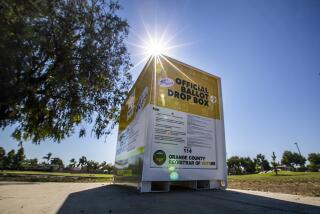Omissions on Voter Lists Anger Bosnian Serbs
BRCKO, Bosnia-Herzegovina — Slavko Maksimovic, the Serbian Orthodox priest here for the past quarter of a century, discovered Sunday that his name had mysteriously vanished from voter registration lists in the weekend’s municipal election.
Like a number of other Bosnian Serbs in the same predicament, Maksimovic had to cast a special ballot that will be put aside, in an envelope with his name on it, until election organizers can determine whether it was a mistake to omit him from the registry.
“It was a humiliating way to vote,” said the white-goateed priest. “I am from Brcko, I wanted to vote for Brcko.”
Voting in Brcko was very much on the minds Sunday of Serbs, who believed they were losing the city; Muslims, who waited in long lines through U.S. military checkpoints to stake their claim; and the international peace envoys, who see the city as a model for Bosnia’s future.
In a two-day election that ended Sunday, Bosnians were choosing local officials to replace de facto war-era authorities. Refugees were allowed to cast ballots for their prewar hometowns, raising the possibility of restoring representatives of the ethnic communities that were “cleansed” from those towns during the war.
This in turn could pave the way for refugees to go home, international officials hope, fulfilling the principal tenet of the U.S.-brokered peace accords that ended Bosnia’s war in December 1995.
But officials concede that the conditions remain inadequate. Economic opportunity must be created, a combat-depleted housing stock rebuilt and police transformed from tools of political repression to public servants.
“While not perfect . . . the elections represent an important step in moving the process along,” the Clinton administration’s point man on Bosnia-Herzegovina, Robert Gelbard, said Sunday night in Sarajevo, the capital. “There were 43 months of war, and now we are only in the 22nd month of peace. To accomplish all this takes time.”
Brcko, a strategic river port that links the two halves of Republika Srpska, the Bosnian Serb republic, is the one piece of territory that the 1995 peace accords could not resolve. Also coveted by the Muslims and Croats, who jointly control the other half of Bosnia, as a trade link and gateway to Europe, it was instead placed under a special U.S. supervisor earlier this year while its fate is decided.
International mediators hope to use Brcko to build a multiethnic local government that can serve as a model for other municipalities. But if the words of Maksimovic, the priest, and other angry Serbs count for anything, reconciliation is a long way off.
Dozens of Serbs crowding into a schoolhouse polling station complained Sunday that they had been left off voter registration lists. Officials of the Organization for Security and Cooperation in Europe, or OSCE, which conducted the election nationwide, said some mistakes were made but anyone who legally registered would be allowed to cast a ballot.
Many of the Serbs, most of whom are refugees from Muslim- or Croat-controlled territory, were convinced that they were being robbed of a right to vote--and that international mediators would cook the results to defeat the Serbs.
“The only thing that is sure is we are losing,” said a decidedly glum Mladen Bosic, head of the Serbian Democratic Party, or SDS, the hard-line ruling party founded by indicted war crimes suspect Radovan Karadzic. The party was caught in a couple of instances trying to register Serbs fraudulently to inflate its voting strength, the OSCE said.
Maksimovic echoed the hard-line Serbs’ fears, accusing international officials of trying to foist onto the residents of Brcko an “artificial” ethnic balance.
“The ‘multiethnicity’ of Bosnia is what caused the war,” the priest said. That is not necessarily the opinion of all Bosnian Serbs, but it is the one heard most loudly in Brcko.
Maksimovic said he approves of an “ethnically pure” Brcko, adding that the departure of Muslims and Croats in 1992 was for the best. Muslims and Croats were rounded up and held in notorious camps, where hundreds were tortured and killed, according to an international war crimes indictment. The rest--nearly 70% of Brcko’s prewar population--were deported.
*
About four miles from downtown Brcko, in a wasteland of ruined houses, hundreds of Muslim refugees who fled or were expelled from Brcko were lining up Sunday to vote. They had to pass through a U.S. Army checkpoint, where they were searched and guard dogs sniffed their cars for explosives. Most continued on foot for about half a mile until reaching the polling station.
Muslims and Croats combined represent just over half Brcko’s registered voters, according to confidential OSCE data. A new city government would include members of all groups, as required by an international arbitrator’s decision in February that dictates rules for Brcko.
Election organizers Sunday night expressed satisfaction with the way the voting had gone in Bosnia, reporting a high turnout and only minor violence.
The most sustained election day trouble involved hard-line Bosnian Croat nationalists who blocked returning Bosnian Serb refugees from casting ballots in Drvar, a western Bosnian city near the border with Croatia. Almost entirely Serbian before the war, Drvar was captured by Croats in 1995 and the population expelled.
Determined to return home, hundreds of the Bosnian Serb refugees were forced to camp out overnight in Drvar to await their chance to vote. Only the intervention and threats of international officials obliged the Bosnian Croats to process the voters.
The Serbs of Drvar--one of the few Bosnian Serb groups supporting the peace accords’ ideal that refugees go home--believe that the Croats have added phantom voters to registration lists in a bid to outnumber Drvar’s prewar Serbian population.
“If the citizens of Drvar don’t win, the [peace] agreement is dead,” Mile Maceta, leader of the Drvar Serbs, said by telephone from his exile home in Banja Luka, 50 miles northeast of the city. “If Croatian fabrications win, then these elections are a farce.
“We believed in these elections,” he added. “They were our only hope for going back.”
More to Read
Sign up for Essential California
The most important California stories and recommendations in your inbox every morning.
You may occasionally receive promotional content from the Los Angeles Times.











